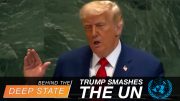Andrey Ternovskiy, one of Russia’s wunderkind Internet entrepreneurs, is being courted by venture capitalists the world over. To get access to cash he needn’t leave Moscow, but he doesn’t want to do business with the billionaire oligarchs tied to the Russian Mafia and Putin’s KGB-FSB machine in the Kremlin.
So, earlier this year the 18-year-old founder of Chatroullet, a webcam-based conversation website, came to the United States to meet with investors. Ternovskiy didn’t tell anyone his itinerary. Nevertheless, when he arrived in New York, there was a chauffer-driven limo waiting for him, courtesy of Yuri Milner and Digital Sky Technologies (DST), Russia’s hottest investment company.
Ternovskiy reportedly has rebuffed DST’s efforts, describing them as "harassing and hounding."
Ryan Tate at gawker.com appropriately describes the DST limo episode as "creepy." However, the experience goes beyond "creepy," illustrating the nexus between Russia’s "business" community and it’s intelligence structures. How did DST know Ternovskiy’s flight schedule? There are a number of ways that DST could have gotten that information, nearly all of which would be illegal in any country where the "rule of law" is more than merely an empty slogan. But considering DST’s high-level ties to Vladimir Putin’s KGB-FSB police-state apparatus, obtaining Ternovskiy’s airline itinerary must have been child’s play.
The Russian teenager is demonstrating better business sense and greater ethical judgment than American corporations, such as social network behemoth Facebook and Wall Street titan Goldman Sachs. Over the past year, DST has made several large investments in Facebook, and now holds a ten percent share in the company, which boasts more than 500 million users worldwide — and continues to grow at a phenomenal rate.
DST, which has also invested heavily in Zynga, the online social network game developer (FarmVille, FrontierVille, Mafia Wars [above], etc.), and Groupon, a deal-of-the-day website, has a billion dollars to invest in Internet companies and, reportedly, is also looking at buying into Twitter.
DST has chosen Goldman Sachs for its initial public offering next year. The choice of Goldman Sachs (GS) is not surprising, as GS already owns an undisclosed stake in DST and, aside from the company’s Russian co-founders, Yuri Milner and Gregory Finger, all three of DST’s partners (Alexander Tamas, Verdi Israelian, and John Lindfors) are former GS executives.
Gangsters R Us
A number of Silicon Valley watchers, and business writers (see here and here) have noted DST’s ties to notorious oligarch Alisher Usmanov, but relatively few have expressed any concern. Many of the media reports, however, have treated DST’s CEO Yuri Milner as if he were an investment rock star, a young Russian Warren Buffet with an uncanny eye for profit potential in tech stocks. But Usmanov, who provided DST’s startup money and is the company’s largest investor (he owns 35 percent, reportedly) is widely recognized as a friend of Putin and one of the most feared of the Russian Mafia dons. Known as "the hard man of Russia," Usmanov is actually an Uzbek with a prison record and a violent past. Perhaps best known outside of Russia as one of the largest share owners of Arsenal, the English Premier League soccer team, Usmanov’s extensive business holdings inside the former Soviet Union include mines, metals factories, media properties, and mobile phones.
Like Vito Corleone (the Marlon Brando character in The Godfather), Usmanov is known for making offers people are afraid to refuse. One who did refuse and is no longer around to talk about it, is Leonid Rozhetskin, a millionaire Russian-American, Harvard-trained lawyer, who wouldn’t sell his 25.1 percent share in Megafon, the Russian mobile phone service provider. In fact, Rozhetskin had filed suit in New York, alleging he had been threatened with physical harm unless he sold his stake. In May 2008 Rozhetskin disappeared from his vacation villa in Latvia; only a pool of his blood remained. And Usmanov ended up in control of Megafon. All indications are that Rozhetskin was murdered. His mother points to the Putin government as the responsible culprit. But Usmanov is the Putin underling most likely to have ordered the hit. The New York-based media-celebrity blog gawker.com refers to Usmanov as "The Scary Russian Oligarch Seducing Silicon Valley."
Craig Murray, the former British ambassador to Uzbekistan, has been Usmanov’s unrelenting pursuer and nemesis. Mr. Murray wrote last year on his website:
Usmanov became a billionaire oligarch in the gangster takeover of Russia’s "privatised" mineral assets. He is close to Putin, and has been used by him to buy up and neutralise much of the little remaining independent media in Russia. Usmanov does this in his own name or as Chairman of GazpromInvestHolding. Independent journalists have died in mysterious accidents following Usmanov takeovers.
For a blackmailer who is a key tool in Putin’s increasingly authoritarian regime, to have a share in Facebook is totally unacceptable.
Of course, for those journalists and media organs that can’t be bought, bribed or killed (at least, not yet) there’s always the threat of the libel suit, which is a particularly effective intimidating tactic in Britain. Murray notes:
"Usmanov uses lawyers to close down blogs who carry these facts."
And indeed he does, as reported here, here, and here.
The British television station Channel 4 News provided one of the few expose’s of Usmanov’s heavy hand, with its broadcast of "Blogs Vs. Usmanov."
A report from the Open Source Center entitled "Kremlin Allies’ Expanding Control of Runet Provokes Only Limited Opposition," released in February 2010 details the concentration of news media and Internet media ownership in Russia in the hands of the Putin Circle of oligarchs. The preface of the report states:
Pro-Kremlin oligarchs have gradually acquired significant stakes in the most popular websites in Russia, apparently seeking profitable investments, while augmenting other government moves to establish control over the Russian Internet…. With the government closely controlling TV and much of the press, the Internet has been the main venue for expression of opposition views, and social networking sites, which have become extremely popular, have developed outside government control.
The report states:
Usmanov’s June 2008 purchase of 50% of LiveJournal from SUP prompted speculation
about censorship, but also criticism of SUP’s management of the resource. Cyxymu,d a blogger and professor in Tbilisi, Georgia, expressed fears that this was part of a plan by the authorities to rein in freedom of speech on the Internet: "That means everything will be under the control of the FSB [Federal Security Service]. Or more accurately under greater control than earlier" (22 June 2008).
Concerning the ties of Yuri Milner and Digital Sky Technologies (DST) to Usmanov, the Open Source Center report says:
Yuriy Milner and Grigoriy Finger formed DST in 2005 with their own money and funds from
outside investors, which now include Goldman Sachs and Alisher Usmanov. While DST
continues to be controlled by the two founders, Usmanov now owns 35% of the company,
making him the single-largest shareholder.
DST is a dominant force in the Runet, owning the most popular websites in the CIS, including
Russia, Ukraine, Kazakhstan, Georgia, and Armenia, and estimates that over 70% of all page
views in the Russian-language Internet are on its companies’ websites (Dst-global.com, 2
February). In Russia, DST owns a significant stake in VKontakte, a Facebook clone and the
largest social network site in Russia, and a controlling interest in Forticom group, the owner of
Odnoklassniki.ru, a very popular Russian clone of Classmates.com and third-most popular
social network in Russia. DST owns more than half of the second-most popular site overall,
Mail.ru, which offers a variety of services including news, e-mail, a search engine, directories,
chats, job services, blogs, role-playing games, and messaging. Mail.ru also controls several
other important Internet projects. Because of the prevalence of the Runet in the former Soviet
space, these sites are also the most popular sites in Uzbekistan, Kazakhstan, Ukraine, and
Moldova. Outside of Russia, DST owns Seznam.cz, a Czech social networking site; a majority
share in Nasza-klasa.pl, a Polish clone of Classmates.com, and a significant stake in Estonian
jobs portal CV Keksus, the number two site in Estonia, based on a Gemius research report
from January 2009. The company’s 75% interest in Forticom also gives it control of some of
the top portals in Lithuania, Latvia, and Estonia — One.lt, One.lv, and One.ee.
Usmanov is the single-largest stakeholder of DST (Russkiy Newsweek, 17 August 2009).
According to Finam expert Leonid Delitsyn, "Alisher Usmanov is not an investor for whom
state interests are an alien concept… When his structures acquire a media asset this is seen as a
deal that has been done with the state’s approval" (Infox.ru, 3 July, 2009). According to
Russkiy Newsweek, the Russian version of international news magazine Newsweek, the Internet
community views Usmanov as "an outright government surrogate" (17 August 2009).
Usmanov is considered especially close to President Medvedev. For a long time he was a top
official of Gazprom where Medvedev was chairman.
Milner, DST, and Putin
However, Usmanov is not the only problem with the DST/Facebook deal. DST’s Yuri Milner boasts a softer image and a more polished vita — stints at the Wharton Business School and the World Bank — but there is no question that he is a favored member of the Kremlin’s stable of oligarchs. Milner is a member of the Government Commission on High Technology and Innovations chaired by Prime Minister Putin. The recent August 3 meeting of the Commission, led by Putin himself, (see here and here) took place at the Gazprom research institute, Usmanov’s lair.
Are these the folks you want having access to all the personal data on your Facebook account?
Related content:
“Breathing Pixie Dust” – Investing in Russia
Obama’s Russia Adviser Michael McFaul and the Russian Spies
The Government and Goldman Sachs




